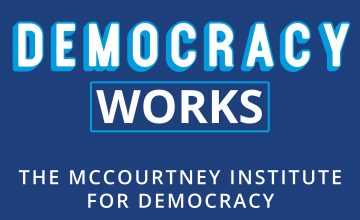Podcast: Play in new window | Download | Embed
Subscribe: Apple Podcasts | Spotify | Email | TuneIn | RSS | More
 You might remember Aaron Maybin from his time on the football field at Penn State or in the NFL. These days, he’s doing something much different. He’s an artist, activist, and educator in his hometown of Baltimore and talked with us about the way that those things intersect.
You might remember Aaron Maybin from his time on the football field at Penn State or in the NFL. These days, he’s doing something much different. He’s an artist, activist, and educator in his hometown of Baltimore and talked with us about the way that those things intersect.
Celebrities and philanthropists often want to help places like Baltimore, but do so without understanding the needs of the local community. Aaron is in an interesting position because he can talk the talk and walk the walk. To him, organizing is about much more than weighing in on the latest Twitter outrage or showing up at a protest to take a photo for Instagram. The real work begins once the cameras go off and the attention fades away.
Aaron has a really unique— and really inspiring — perspective that might change the way you think about places like Baltimore. A huge thank you to WYPR in Baltimore for letting us use their studio for the interview.
Additional Information
Interview Highlights
[6:25] How did you transition from athlete to activist?
From the beginning, my work here in the city of Baltimore wasn’t always a big priority for me. I’m so appreciative of everything that the game has given me in my life, what it’s given my family. But I think that I’m prouder now of the work that I’m doing and the impact that I’m having in people’s lives and on my city in general. I’m proud of then that, that anything that I ever did as an athlete.
[8:41] How does teaching fit into your art and activism?
I was doing art workshops and programming at schools all across Baltimore starting in 2009. By 2010, 2011, I realized how naive I was as like a 20-year-old coming into the League thinking that like this contract I’ll get will be enough for me to fix all the problems in my city. It sounds crazy to say, but when you’re that young and ambitious you’re really ignorant enough to believe that you’re gonna be able to do that yourself. So I said, “All right, I’ve got to find a school, one school, that I can plant myself in and actually hammer out this curriculum and see over the course of a year, two years, you know, what we can accomplish with the same group of kids over an extended period of time.”
[14:45] What’s the difference between organizing on social media and the deeper-level work you try to do?
If there’s a topic that’s trending, everybody wants to weigh in on it. But at the end of the day, how much do you really think this tweet is getting you? Not much unless you are actually showing up to meetings and getting boots on the ground and staying informed about what’s going on.
[20:33] Do you think that someone needs to be part of a community to affect the greatest change in one?
I do think that a person that’s going to create the greatest change is probably going to be a person that comes from there. You know, and that’s not saying that great ideas can’t come from outsiders, bcause sometimes you can get too isolated in your bubble. But I think that too often the people that are in positions to make the decisions that really affect the lives of the people that live in these areas, the constituents that truly need to be represented.
[36:40] What does democracy mean to you?
To me democracy is a beautiful idea, but it’s an idea, and with any idea you have to work constantly, constantly to manifest it. And even once some of that work is done and you feel like progress has been made, the beauty of democracy is we have to go back and we have to continuously self evaluate and see if we’re on the right side of history. And I think that um the more that we have a true understanding of what democracy is um the better Americans we’ll all be.
